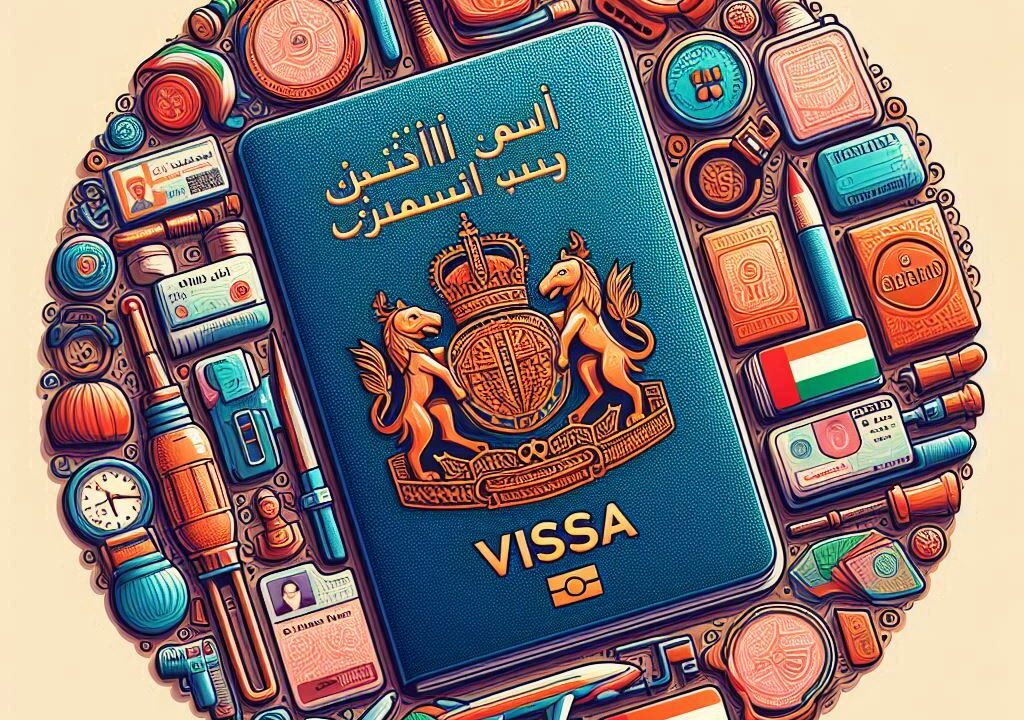The United Arab Emirates (UAE) is a vibrant and diverse country that attracts millions of visitors, workers, and residents from all over the world. Navigating the UAE’s immigration system involves understanding two crucial elements: the UAE Visa and the Emirates ID. These documents play an essential role in determining legal entry, stay, and residency in the country.
In this comprehensive guide, we’ll explore what UAE visas are, the types available, how to apply for them, and the process of obtaining an Emirates ID, a crucial identification document for residents.
What is a UAE Visa?
A UAE Visa is an official document or stamp in your passport that allows foreign nationals to enter, stay, or live in the UAE. The visa type depends on the purpose of your visit, such as tourism, business, employment, or long-term residency.
Types of UAE Visas
1. Tourist Visa
The Tourist Visa allows individuals to visit the UAE for leisure and tourism purposes. This visa is generally issued for a short period, ranging from 30 to 90 days, depending on the nationality and specific visa requested.
- Eligibility: Nationals of most countries can apply for a UAE tourist visa. However, citizens of some countries can get a visa on arrival, while others may need to apply in advance.
- Validity: Single-entry and multiple-entry tourist visas are available, valid for 30, 60, or 90 days.
- Application: It can be applied for through airlines, travel agencies, or UAE-based hotels.
2. Visit Visa
The Visit Visa is for individuals visiting family, friends, or business associates in the UAE. Unlike a tourist visa, a visit visa is usually sponsored by a UAE resident, relative, or employer.
- Eligibility: Sponsored by a UAE resident or a UAE company.
- Validity: Issued for 30 or 90 days, with single-entry or multiple-entry options.
- Sponsorship: A UAE resident or company must act as your sponsor.
For more information, you can speak to Happy Face
3. Employment Visa
The Employment Visa is for individuals who have secured a job in the UAE and are sponsored by their employer. It allows foreigners to work legally in the UAE.
- Eligibility: Individuals with a confirmed job offer in the UAE.
- Validity: Initially, this visa is valid for 60 days, during which the employer must complete the formalities to convert it into a residency visa.
- Application: The company handles the visa processing.
4. Residency Visa
The Residency Visa is for individuals who intend to live in the UAE for an extended period. This visa is essential for anyone planning to stay in the UAE beyond the short-term tourist or visit visa, including workers, investors, students, and family members of UAE residents.
- Eligibility: Granted to workers, family members of UAE residents, students, investors, and business owners.
- Validity: Typically, residency visas are issued for 1, 2, or 3 years, depending on the type.
- Sponsorship: Either an employer, family member, or educational institution sponsors the visa.
5. Investor Visa
The Investor Visa is designed for individuals who invest in UAE property or businesses. It allows them to reside in the UAE as long as their investment is maintained.
- Eligibility: Investors meeting the UAE’s financial threshold.
- Validity: 3 to 5 years, depending on the amount of the investment.
- Benefits: The investor can sponsor family members for residency.
For more information, you can speak to Happy Face
How to Apply for a UAE Visa
The UAE visa application process varies depending on the type of visa you are applying for. Generally, the steps involve the following:
-
- Determine the Visa Type: Select the appropriate visa based on the purpose of your visit.
- Submit the Application: Apply through the General Directorate of Residency and Foreigners Affairs (GDRFA) website, a UAE embassy, or the relevant agency (such as an airline or hotel).
- Provide Required Documents: The basic documents required include:
- Passport with a minimum of six months’ validity
- Passport-sized photos
- Completed visa application form
- Proof of funds, accommodation, and return travel (for tourist and visit visas)
- Pay Visa Fees: Fees vary depending on the visa type and duration.
- Processing Time: Visa processing times vary, ranging from a few hours to several days, depending on the type and applicant’s nationality.
For more information, you can speak to Happy Face
What is the Emirates ID?
The Emirates ID is a government-issued identification card for all UAE residents and citizens. It is a mandatory document required for legal identification in the UAE and is essential for performing various activities such as opening a bank account, renting property, accessing government services, and even obtaining health insurance.
The Emirates ID is linked to a resident’s visa and is typically issued after obtaining a residency visa. It contains key biometric data, including fingerprints, and is embedded with a smart chip that stores information securely.
Importance of the Emirates ID
The Emirates ID serves multiple purposes and is essential for daily life in the UAE. Here’s why it’s crucial:
- Legal Identification: The Emirates ID is the primary form of identification in the UAE. It is required for all official and legal purposes, including interactions with government departments, law enforcement, and private businesses.
- Access to Government Services: Without an Emirates ID, residents cannot access many government services, including healthcare, transportation, and educational services.
- Proof of Residency: The Emirates ID acts as proof that the holder is legally residing in the UAE. It is also necessary for obtaining a driver’s license, registering a car, and getting utility services such as electricity and water.
- Financial Transactions: Opening a bank account, obtaining a credit card, and other financial transactions require an Emirates ID.
For more information, you can speak to Happy Face
How to Apply for an Emirates ID
To obtain an Emirates ID, you need to follow a structured process. Here are the steps:
1. Apply for a Residency Visa
The first step in getting an Emirates ID is applying for a Residency Visa. After securing employment, investment, or family sponsorship, the relevant party will sponsor the visa application on your behalf.
- Once the residency visa is granted, you can apply for the Emirates ID.
2. Fill Out the Application Form
The Emirates ID application can be completed online through the Federal Authority for Identity, Citizenship, Customs, and Port Security (ICP) website or at an authorized typing center.
-
- Documents Required:
- Valid passport
- Residency visa details
- Passport-sized photos
- Completed application form
For more information, you can speak to Happy Face
3. Biometric Enrollment
Once the application is submitted, you will need to undergo biometric screening at an authorized ICP service center. The biometric process includes capturing fingerprints and facial recognition for identity verification.
4. Processing and Issuance
After your biometric data is captured, the Emirates ID will be processed. It usually takes a few days to a few weeks for the ID to be ready. You will receive an SMS notifying you when and where you can collect your Emirates ID.
Renewal and Replacement of Emirates ID
1. Renewal Process
The Emirates ID must be renewed before its expiry date, which typically coincides with the expiration of the residency visa.
- The renewal process is similar to the initial application process:
- Submit the renewal application through the ICP website or a typing center.
- Undergo biometric verification if needed.
- Pay the renewal fee.
- Once processed, you can collect the renewed Emirates ID.
2. Replacement of Lost or Damaged Emirates ID
If your Emirates ID is lost or damaged, you must report it immediately to the authorities and apply for a replacement.
-
- Steps:
- Report the lost or damaged card to the nearest ICP center.
- Submit a replacement application.
- Pay the applicable fees.
- Receive a new Emirates ID.
For more information, you can speak to Happy Face
Linking UAE Visa and Emirates ID
For residents, the UAE visa and Emirates ID are closely linked. You cannot obtain an Emirates ID without a valid residency visa, and both documents must be renewed simultaneously. The Emirates ID is essentially an extension of the residency visa and serves as proof of your legal status in the country.
In the case of employment or family sponsorship, the renewal or cancellation of the visa directly impacts the status of the Emirates ID. If the visa is canceled or expires, the Emirates ID also becomes invalid.
Recent Changes and Updates
The UAE government is continuously evolving its visa and residency policies to attract foreign talent, investors, and tourists. Some notable updates include:
- Golden Visa Program: The UAE now offers long-term residency visas (5-10 years) for investors, entrepreneurs, scientists, and professionals in various fields. Holders of Golden Visas can benefit from longer residency periods and more flexibility in sponsoring family members.
- Remote Work Visa: The UAE has introduced a remote work visa, allowing professionals to live in the UAE while working remotely for companies based outside the country.
- Smart Services: The UAE is moving towards digitizing all visa and Emirates ID processes. You can now apply for, renew, and manage your visa and Emirates ID online through the ICP and other government platforms.
For more information, you can speak to Happy Face
Understanding the UAE visa system and the Emirates ID process is crucial for anyone looking to live, work, or stay in the UAE. The visa allows you legal entry into the country, while the Emirates ID ensures you have access to all essential services and legal recognition as a resident.
Navigating the application process for both the UAE visa and Emirates ID is straightforward if you follow the guidelines and stay updated on the latest immigration policies. Whether you’re visiting the UAE for tourism, working, or planning long-term residency, ensuring you have both documents in order is vital for a smooth and legally compliant stay.
Disclaimer
Related Post :
UAE VISA WITH OLD PASSPORT NUMBER
UAE VISA FOR PAKISTANI NATIONALS








